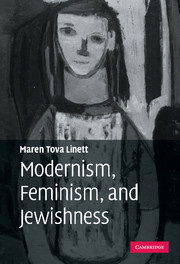Book contents
- Frontmatter
- Contents
- Acknowledgments
- List of abbreviations
- Introduction: imagined Jews and the shape of feminist modernism
- 1 “Strip each statement of its money motive”: Jews and the ideal of disinterested art in Warner, Rhys, and Woolf
- 2 Transformations of supersessionism in Woolf and Richardson
- 3 Adding bathrooms, fomenting revolutions: modernity and Jewishness in Woolf and Warner
- 4 The race must go on: gender, Jewishness, and racial continuity in Barnes and Richardson
- 5 The “No time region”: time, trauma, and Jewishness in Barnes and Rhys
- 6 Metatextual Jewishness: shaping feminist modernism
- Notes
- Works cited
- Index
4 - The race must go on: gender, Jewishness, and racial continuity in Barnes and Richardson
Published online by Cambridge University Press: 22 September 2009
- Frontmatter
- Contents
- Acknowledgments
- List of abbreviations
- Introduction: imagined Jews and the shape of feminist modernism
- 1 “Strip each statement of its money motive”: Jews and the ideal of disinterested art in Warner, Rhys, and Woolf
- 2 Transformations of supersessionism in Woolf and Richardson
- 3 Adding bathrooms, fomenting revolutions: modernity and Jewishness in Woolf and Warner
- 4 The race must go on: gender, Jewishness, and racial continuity in Barnes and Richardson
- 5 The “No time region”: time, trauma, and Jewishness in Barnes and Rhys
- 6 Metatextual Jewishness: shaping feminist modernism
- Notes
- Works cited
- Index
Summary
Christian theological discourses about Judaism have long associated Jews with the body while identifying Christians with the spirit. As the previous chapters make clear, this association is integral to stereotypes of Jewish materiality and financial acuity as well as to supersessionist models of Christian theology. In her seminal study Faith and Fratricide (1974), Rosemary Ruether describes the larger context and philosophical underpinnings of this anti-Judaic claim. Ruether explains that while Hellenistic Jewish philosophers such as Philo worked to spiritualize and universalize Judaic ritual practices, they did not therefore devalue the Torah that commanded those practices. Jewish Hellenistic Midrash, Ruether shows, “sought rather to invest the letter with a spiritual and ethical significance that would make it meaningful to those who had learned to think of truth in philosophical terms.” Jewish Hellenistic thought did accept Platonic dualism about the body and the soul, but it did not reject the body, instead considering it a valuable house for the spirit. “For Philo, it is as wrong to abandon the letter of the Torah for a ‘purely spiritual religion’ that imagines it can dispense with the outward observance, as it would be for a man to imagine that he can live purely in the soul while abandoning the body.” In Ruether's view, it is when this Platonic dualism is “fused” with another sort of dualism that everything associated with the body is dismissed:
This Platonic dualism between the body and the soul, the material and spiritual “worlds,” had governed Philonic exegesis. However, when this spiritualizing exegesis is fused with the messianic dualism between “this age” and the “age to come,” identifying the Church with the eschatological community of the Resurrection, Philo's spiritualizing exegesis, intended to vindicate the inward meaning of Jewish law, is now used to “prove” the radical supersession of Jewish law. Judaism is identified with all that is “old” and “carnal,” while Christianity is spiritual and eschatological “newness.” Judaism is the outward, temporal, and perishable which existed only as a shadow of the inward and eternal covenant of true Being that has now dawned through the power of the Resurrection.
- Type
- Chapter
- Information
- Modernism, Feminism, and Jewishness , pp. 111 - 139Publisher: Cambridge University PressPrint publication year: 2007



